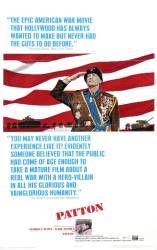Factual error: When Patton orders his driver to drive to the Carthaginian battlefield he addresses him as "sergeant". He is, however, wearing corporal's chevrons. A famous stickler for discipline and ceremonial, Patton is not likely to have made a mistake like this.

Patton (1970)
Directed by: Franklin J. Schaffner
Starring: George C. Scott, Karl Malden, Michael Strong, Stephen Young
Factual error: In one scene of the film, Rommel is shown wearing a swastika pin. Rommel was not a member of the Nazi party and refused to wear any Nazi insignia (outside of uniform symbols which contained it), instead he wore the traditional Prussian Iron Cross.
Revealing mistake: Several maps of Europe shown in the film have Germany divided into East and West, and show national borders from 1945 onwards.
Trivia: As Patton and his convoy are coming into town, Patton's half-track mistakenly flattens a few live chickens. (00:16:55)
Trivia: This film's most remarkable for the ironic choice of vehicles used. All of the German tanks represented in the movie are, in fact, M48 "Patton" tanks borrowed from the Spanish army. This is most likely the first and only time in history a general is unintentionally fighting to destroy his own namesakes!
Trivia: In real life, the infamous soldier slapping scene actually had a somewhat happier outcome. Patton berated the shell shocked trooper largely out of a combination of sleep deprivation (he'd been going for nearly 48 hours without rest) and the emotional turmoil of having so many troops wind up in the hospital due to his commanding decisions. Afterwards he went to a tent, slept for several hours, came back and apologized to the solider.
Capt. Richard N. Jenson: What are you doing there, soldier?
Soldier getting up from floor: Trying to get some sleep, sir.
Patton: Well, get back down there, son. You're the only son of a bitch in this headquarters who knows what he's trying to do.
General Omar N. Bradley: There's one big difference between you and me, George. I do this job because I've been trained to do it. You do it because you love it.
Patton: Look at that, gentlemen. Compared to war, all other forms of human endeavor shrink to insignificance.
Question: Is it just me or does this film seem to have some definite homosexual undertones when it comes to Patton? He dresses flamboyantly, wears lots of jewelry, designs uniforms, caresses his dead staff member, kisses a soldier tenderly after a battle. Did the writers do this intentionally and/or were there rumors about Patton's sexual orientation?
Answer: In real life Patton spoke with a high pitched effeminate voice, not the gruff George C Scott type of voice.
Answer: It's just you.
Question: How accurate is Patton's temper?
Answer: Very accurate, almost spot on, as veterans who served under him during WW2 would attest after seeing the film "Patton." The real life difference between actor George C. Scott and the real General Patton was his voice- unlike the gravel voice that Scott possessed, Patton had a high voice that would get higher the angrier he got.
Join the mailing list
Separate from membership, this is to get updates about mistakes in recent releases. Addresses are not passed on to any third party, and are used solely for direct communication from this site. You can unsubscribe at any time.
Check out the mistake & trivia books, on Kindle and in paperback.




Answer: "The front" means the front line, i.e., where the enemy is being engaged. He's saying that since the soldier isn't physically injured, he should be fighting, not (as Patton sees it) being a coward and shirking his duty.